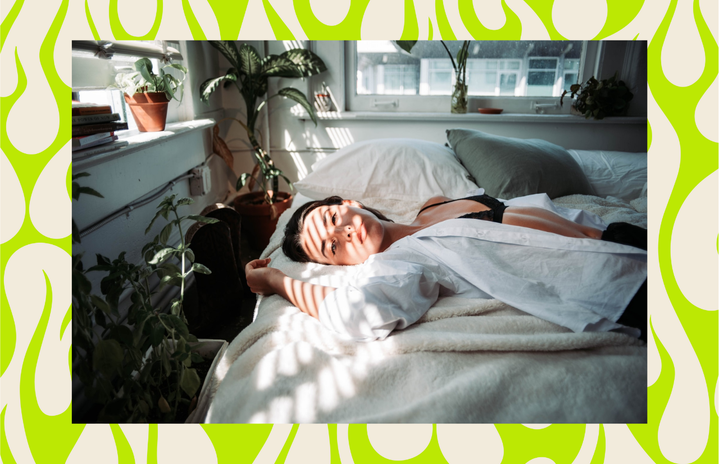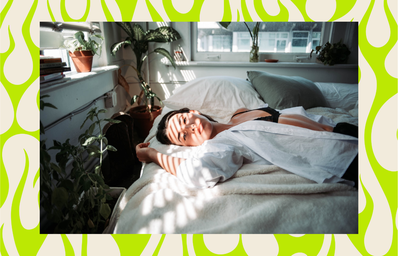“Bed rotting” has become a self-care trend all over TikTok, where you lounge in bed all day and ignore all responsibilities and essentially, “rot” in bed. Bed-rotting has been labeled by many as an act of “self-care”: an easy way to enjoy a “stress-free life”. This “trend” has become incredibly hurtful to many individuals, glorifying depression and mental illness, so I thought I’d explain what bed-rotting really is, thoughts from professionals, and why we overall shouldn’t glorify bed-rotting.
I first want to clarify that this article is NOT meant to shame anyone. If you spend your days bed-rotting, then there shouldn’t be any shame placed on you for that. I have my days where I suffer from an extreme lack of motivation and end up spending the entirety of my day in bed on my phone, because it’s just how I cope with my mental health sometimes. This article is meant to raise awareness on what bed-rotting truly is so it can stop being glorified on social media.
Bed-rotting, contrary to what TikTok claims, is rotting in bed all day due to a lack of motivation and is oftentimes a symptom of depression, according to licensed mental health counselor Catherine Del Toro. A Healthline article written by Michelle Pugle, a health writer certified in mental health first aid, does a really great job at explaining how this new TikTok trend can actually be really harmful to society. Del Toro explains that “The tendency to stay in bed and do nothing all day but scroll, watch TV, eat, and nap are typical traits of a person who is depressed,” (Pugle, 2023).
Before I continue, I feel as though it’s important for me to mention that bed-rotting isn’t always a symptom of depression. You can bed-rot and not have any mental health issues, and this is important to recognize. In an article by Verywell Mind, Bianca Rodriguez, psychotherapist and LMFT, says that bed-rotting can be a lifestyle issue as well, and may be an indicator that certain aspects of your life should be evaluated.
Dr. Sanam Hafeez, NYC neuropsychologist and director of Comprehend the Mind, goes on to say in a Healthline article how there are many negative effects of bed-rotting, including depression, anxiety, sleep disorders, muscle weakness, and blood circulation issues. I could honestly write a whole article just diving into all of the negative effects of bed-rotting that I found while doing further research, because there are so many more detrimental effects to bed-rotting other than what Dr. Hafeez mentioned. These side effects are obviously not worth partaking in the “trend” of bed-rotting, so it’s peculiar as to why so many influencers promote it on their social media page knowing how easy influenced their audience is.
Helene D’Jay, licensed professional counselor and executive director of Young Adult Services, Newport Healthcare, explains that bed-rotting can ultimately potentially lead to a “vicious cycle in which staying in bed further reinforces negative emotions and disengagement from life’s responsibilities and joys,” (Pugle, 2023). By promoting bed-rotting on TikTok, it can eventually become a habit for some individuals, which obviously comes with consequences. Not only is the glorification of bed-rotting so harmful for individuals who do suffer from depression or other mental illnesses, but it can also influence younger audiences to engage in bed-rotting, which inevitably leads to unhealthy and detrimental habits.
In a Psychology Today article, licensed clinical social worker and psychotherapist Amy Morin rationalizes that bed-rotting supports “avoidance, rumination, and sleep disruption,” (Morin, 2023). Morin gives alternative, healthy ways to recharge besides resorting to bed-rotting, such as spending time in nature, reading a book, going for a walk, doing yoga, enjoying a digital detox, and/or spending time with loved ones. There are so many alternatives to bed-rotting that can reduce the stress of everyday life. It’s okay to rot in bed sometimes, it happens! However, professionals remind us that it’s important to also find healthy coping mechanisms to engage in as well.
While it’s crucial to set aside time to rest and recharge your mental battery, licensed therapist and sleep specialist Annie Miller says that “bed-rotting is one of the worst things you can do for your sleep,” (Breen, 2023). According to Miller in a VeryWellMind article, lying in bed all day disrupts the body’s sleep drive, further making it harder to get a good night’s sleep. She explains that it’s important to reserve one’s bed as a place for only sleep and sex, because keeping a strong association that the bed is for sleep leads to conditioning and results in easier sleep at night.
It’s important to recognize that bed-rotting is okay in moderation. I’m not sitting here telling you that you should never take mental health days where you spend some extra time in bed; it’s just important to recognize how often you’re spending your day in bed. Clinical psychologist Nicole Hollingshead explains the best way to properly bed-rot in an article by Health OSU. Hollingshead says that scheduling a self-care day is the right way to bed-rot; by carving out an hour or more to recharge after looking at your schedule, you can properly have some self-care time to rejuvenate without any of the negative consequences. Annie Miller also elaborates on the right way to bed-rot as well, explaining that bed-rotting is healthier if it isn’t done for the entire day and if it’s combined with other forms of self care, such as spending some time outside and engaging in physical activity.
Psychiatrist and professor Samantha Boardman wrote an amazing article on Psychology Today detailing several great ways to recharge rather than resorting to bed-rotting, and I’d definitely recommend taking a look at it if bed-rotting is something that you struggle with.
Bed-rotting is a serious thing that shouldn’t be glorified or treated as a self-care trend. TikTok influencers have been claiming that bed-rotting is “perfect” and a way to “embrace soft-living” to overall live a “stress-free life”. Rotting in bed all day, whether it’s for days at a time or weeks at a time, has serious consequences and professionals have concluded that it shouldn’t be encouraged as a trend on social media.
Suffering with a lack of motivation, lifestyle issues, and/or mental health problems can make life so hard, but there are better ways to cope with it! I know that I definitely struggle with bed-rotting sometimes, but I try to remind myself not to make it a habit, and to do it in moderation, following the tips from other professionals about how to bed-rot healthily. The main point that should be taken from this article is that you don’t always have to follow trends on TikTok or other social media platforms, because they can unknowingly have detrimental effects. Make sure to listen to your body and do what feels best for your mental health, while also trying your best to mix in some healthier ways to practice self-care and destress!


